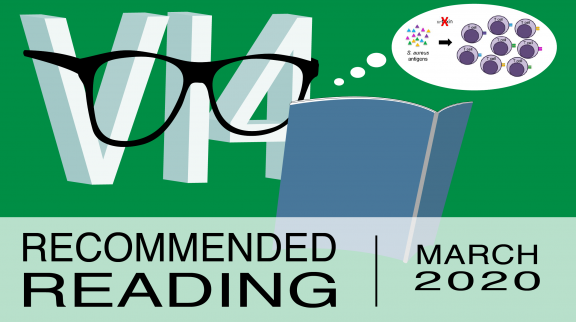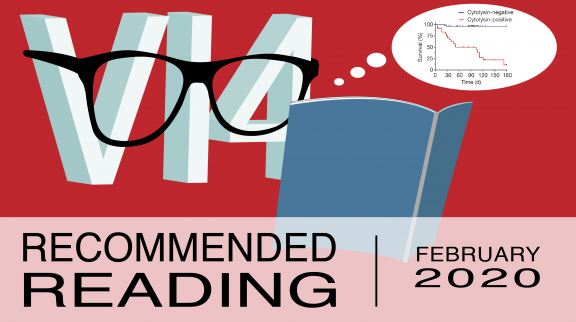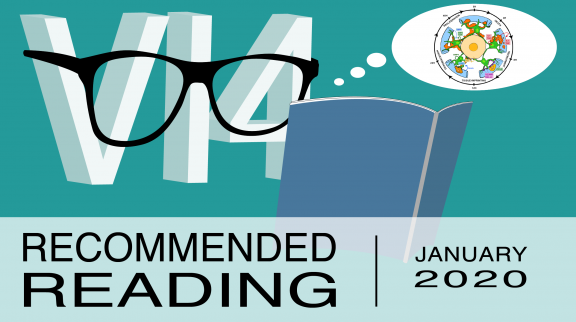The fields of infection biology, immunobiology and inflammation research is varied and ever-expanding. Researchers the world over are making discoveries that contribute greatly to our collective understanding of health and disease. VI4 is committed to providing our members, students, and community resources to aid in knowledge-building in these core VI4 research areas. Please check out our current curated recommended reading list below from scientists across the country!
Recommended Reading - March 8th, 2020
- FPR1 is the plague receptor on host immune cells. Osei-Owusu P, et al. in Nature, September 18, 2019
- Structure elucidation of colibactin and its DNA cross-links. Xue M, et al. in Science, September 6, 2019
- Ketogenic diet activates protective γδ T cell responses against influenza virus infection. Goldberg EL, et al. in Science, November 11, 2019
- Staphylococcus aureus toxin suppresses antigen-specific T cell responses. Lee B, et al. in The Journal of Clinical Investigation, December 24, 2019
- Peripheral T cell expansion predicts tumour infiltration and clinical response. Wu TD, et al. in Nature, February 26, 2020
Bonus Recs!
- Peritoneal GATA6+ macrophages function as a portal for Staphylococcus aureus dissemination. Jorch S, et al. in The Journal of Clinical Investigation, September 23, 2019
- Microbial metabolites control the thymic development of mucosal-associated invariant T cells. Legoux F, et al. in Science, October 10, 2019
- A metagenomic strategy for harnessing the chemical repertoire of the human microbiome. Sugimoto Y, et al. in Science, December 13, 2019
- Simulation modelling for immunologists. Handel A, et al. in Nature, December 5, 2019
- Improved protein structure prediction using potentials from deep learning. Senior A W, et al. in Nature, January 15, 2020

Recommended Reading - February 9th, 2020
- Dietary Intake Regulates the Circulation Inflammatory monocyte Pool. Jordan S, et al. in Cell, August 22, 2019
- Bacteriophage targeting of gut bacterium attenuates alcoholic liver disease. Duan Y, et al. in Nature, November 13, 2019
- Metabolic regulation of gene expression by histone lactylation. Zhang D, et al. in Nature, October 23, 2019
- Cyclophilin A protects HIV-1 from restriction by human TRIM5a. Kim K, et al. in Nature Microbiology, December 4, 2019
- Correlative three-dimensional super-resolution and block-face electron microscopy of whole vitreously frozen cells. Hoffman D, et al. in Science, January 17, 2020

Recommended Reading - January 12th, 2020
- Microbiota-derived lantibiotic restores resistance against vancomycin-resistant Enterococcus. Kim S, et al. in Nature, August 21, 2019
- Primary prostate cancer educates bone stroma through exosomal pyruvate kinase M2 to promote bone metastasis. Dai J, et al. in Journal of Experimental Medicine, September 23, 2019
- Stellate Cells, Hepatocytes, and Endothelial Cells Imprint the Kupffer Cell Identity on Monocytes Colonizing the Liver Macrophage Niche. Lewin G, et al. in Cell Press, September 24, 2019
- Neuropeptide CGRP Limits Group 2 Innate Lymphoid Cell Responses and Constrains Type 2 Inflammation. Nagashima H, et al. in Science Direct, October 15, 2019
- Mimicking the human environment in mice reveals that inhibiting biotin biosynthesis is effective against antibiotic-resistant pathogens. Carfrae L, et al. in Nature, October 28, 2019

Recommended Reading - December 8th, 2019
- Long-Distance Cooperative and Antagonistic RNA Polymerase Dynamics via DNA Supercoiling. Sangjin Kim, et al. in Cell Press, September 19, 2019
- TGFβ blocks IFNα/β release and tumor rejection in spontaneous mammary tumors. Guerin M, et al. in Nature, September 11, 2019
- Large-scale identification of pathogen essential genes during coinfection with sympatric and allopatric microbes. Lewin G, et al. in PNAS, September 24, 2019
- Bulk tissue cell type deconvolution with multi-subject single-cell expression reference. Wang X, et al. in Nature, January 22, 2019
- Migratory DCs activate TGF-β to precondition naïve CD8+ T cells for tissue-resident memory fate. Mani V, et al. in Science, October 11, 2019

Recommended Reading - October 13th, 2019
- Immune induction strategies in metastatic triple-negative breast cancer to enhance the sensitivity to PD-1 blockade: the TONIC trial. Voorwerk L, et al in Nature, May 13, 2019
- Human Influenza A Virus Hemagglutinin Glycan Evolution Follows a Temporal Pattern to a Glycan Limit. Yewdell JW, Altman MO, et al in American Society for Microbiology, April 1, 2019
- Microbial Exposure Enhances Immunity to Pathogens Recognized by TLR2 but Increases Susceptibility to Cytokine Storm through TLR4 Sensitization. Huggins M, et al in Cell Reports, August 13, 2019
- Altered immunity of laboratory mice in the natural environment is associated with fungal colonization. Yeung F, et al in bioRxiv, August 21, 2019
- Discovery and inhibition of an interspecies gut bacterial pathway for Levodopa metabolism. Rekdal V, et al in Science, June 14, 2019

Stevenson Center
(Daniel Dubois / Vanderbilt University)
Recommended Reading - September 11th, 2019
- Plants send small RNAs in extracellular vesicles to fungal pathogen to silence virulence genes. Cai Q, Jin H, et al in Science, June 8, 2018
- Dysfunctional CD8 T Cells Form a Proliferative, Dynamically Regulated Compartment within Human Melanoma. Amit I, Li H, et al in Cell Press, February 7, 2019
- Innate lymphoid cells support regulatory T cells in the intestine through interleukin-2. Sonnenberg GF, Zhou L, et al in Nature, April 3, 2019
- A c-di-GMP-Based Switch Controls Local Heterogeneity of Extracellular Matrix Synthesis which Is Crucial for Integrity and Morphogenesis of Escherichia coli Macrocolony Biofilms. Hengge R, Serra D in Journal of Molecular Biology, April 4, 2019
- TCR Transgenic Mice Reveal Stepwise, Multi-site Acquisition of the Distinctive Fat-Treg Phenotype. Li C, Mathis D, et all in Cell Press, June 7, 2018

August 17, 2019
Recommended Reading - January 7th, 2019
- Salt-responsive gut commensal modulates Th17 axis and disease. Wilck N, Müller DN, et al in Nature, November 15, 2017
- Gut microbiome influences efficacy of PD-1-based immunotherapy against epithelial tumors. Routy B, Zitvogel L, et al in Science, November 2, 2017
- Redox-Sensing Under Hypochlorite Stress and Infection Conditions by the Rrf2-Family Repressor HypR in Staphylococcus aureus. Van Loi V, Antelmann H, et al in Antioxidants & Redox Signaling, September 1, 2018
- Dietary and Microbial Oxazoles Induce Intestinal Inflammation by Modulating Aryl Hydrocarbon Receptor Responses. Iyer s, Blumberg RS, et al in Cell, May 17, 2018
- Single-Cell RNA-Seq Reveals the Transcriptional Landscape and Heterogeneity of Aortic Macrophages in Murine Atherosclerosis. Cochain C, Zernecke A, et al in Circulation Research, June 8, 2018

Recommended Reading - October 25th, 2018
-
Discovery and characterization of a prevalent human gut bacterial enzyme sufficient for the inactivation of a family of plant toxins. Koppel N, Balskus EP, et al in eLife, May 15, 2018
-
Staphylococcus aureus clumping factor A is a force-sensitive molecular switch that activates bacterial adhesion. Herman-Bausier P, Dufrêne EF, et al in Proceedings of the National Academy of Sciences, May 2018
-
Blocking Neuronal Signaling to Immune Cells Treats Streptococcal Invasive Infection. Pinho-Ribeiro FA, Chiu IM, et al in Cell, May 10, 2018
-
Atlas of the Immune Cell Repertoire in Mouse Atherosclerosis Defined by Single-Cell RNA-Sequencing and Mass Cytometry. Winkels H, Wolf D, et al in Circulation Research, June 8, 2018
-
Inflammation-induced IgA+ cells dismantle anti-liver cancer immunity. Shalapour S, Karin M, et al in Nature , November 16, 2017

Recommended Reading - September 27th, 2018
-
Identification of a Functionally Unique Family of Penicillin-Binding Proteins. Welsh MA; Taguchi A; et al. in Journal of American Chemical Society, November 28, 2017
-
Nociceptor sensory neurons suppress neutrophil and γδ T cell responses in bacterial lung infections and lethal pneumonia. Baral P; Umans BD; et al. in Nature Medicine, March 5, 2018
-
Extensive impact of non-antibiotic drugs on human gut bacteria. Maier L; Pruteanu M; et al. in Nature Medicine, March 19, 2018
-
Gut microbiome modulates response to anti–PD-1 immunotherapy in melanoma patients. Gopalakrishnan V; Spencer CN et al. in Science, Jannury 5, 2018
-
Functional interrogation and mining of natively paired human VH:VL antibody repertoires. Wang B; DeKosky BJ et al. in Nature Biotechnology, January 8, 2018

Recommended Reading - August 30th, 2018
- Host Nitric Oxide Disrupts Microbial Cell-to-Cell Communication to Inhibit Staphylococcal Virulence. Urbano R; Fang, FC; et al. in Cell Host Microbe, May 9, 2018
-
Dietary trehalose enhances virulence of epidemic Clostridium difficile. Collins, J; Britton, A; et al in Nature, January 18, 2018
-
Comprehensive skin microbiome analysis reveals the uniqueness of human skin and evidence for phylosymbiosis within the class Mammalia. Ross, AA; Neufeld, JD; et al. in PNAS, June 19, 2018
-
Gut microbiome–mediated bile acid metabolism regulates liver cancer via NKT cells. Ma, C; Gretan, TF; et al. in Science, May 25, 2018
-
In vivo imaging reveals a tumor-associated macrophage–mediated resistance pathway in anti–PD-1 therapy. Arlauckas, S; Pittet, MJ; et al. in Science Translational Medicine May 10, 2017
